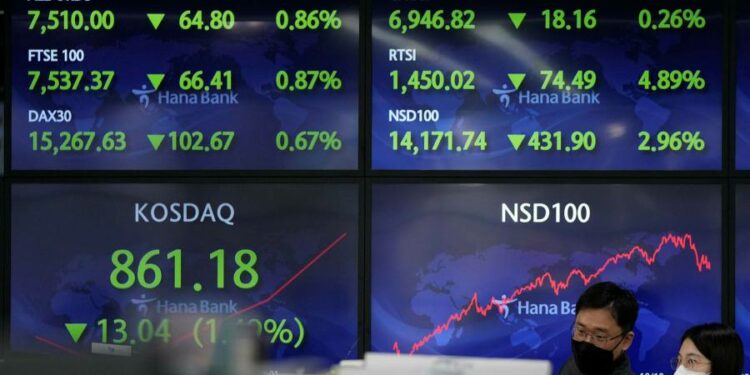European equities dropped sharply on Monday after Russia’s army claimed it had destroyed two Ukrainian fighting vehicles that had crossed over to Russia, killing five people.
The regional Stoxx Europe 600 share gauge fell as much as 1.9 per cent in the early afternoon and was down 1.3 per cent in recent trading.
The claims from Russia about the unconfirmed incident would mark the first direct clashes with Ukrainian forces since Moscow amassed 190,000 troops at the border.
US President Joe Biden and Russian leader Vladimir Putin had earlier accepted “the principle” of a possible summit to ease tensions over Ukraine.
In Russia, the main Moex index fell by more than 8 per cent, while the rouble lost 1.5 per cent against the dollar.
Investors have become increasingly cautious about how to respond to flow of news concerning Russia’s intentions over Ukraine, with bad news causing sharp equity market sell-offs while relief rallies have been moderate and short lived.
The FTSE All World share index has fallen for six of the past eight sessions and has lost 2.3 per cent so far this month. Meanwhile, the price of spot gold, which dipped 0.1 per cent to $1,896 a troy ounce on Monday, has gained about 5 per cent since the end of January.
“Since last week, every market top is getting lower and lower and institutional money is getting cold feet,” said Florian Ielpo, head of macro at Lombard Odier Investment Managers.
“Every bit of news we are getting [about Ukraine] is more confusing,” he added, while overall, “the market is preparing itself for a bad moment”.
On Sunday, French President Emmanuel Macron spoke to Russia’s president in two lengthy phone calls, in what a French official described as “part of the last possible and necessary efforts to avoid a major conflict”.
A Biden administration official told the Financial Times the format and timing of a possible Biden-Putin summit remained “to be determined” and it was “all completely notional”.
The Kremlin on Monday then said there were “no concrete plans” for such a meeting, but did not rule out the option.
Moscow has massed as many as 190,000 troops on Ukraine’s borders despite previously pledging they would return to Russia. Belarus, meanwhile, said over the weekend that 30,000 Russian troops participating in joint drills would stay indefinitely.
Currency and government bond markets started Monday’s session pricing in some cautious optimism about a diplomatic resolution to the Ukraine stand-off, before the mood became more subdued.
The dollar index, which measures the currency against six others and tends to rise alongside geopolitical tensions, was flat.
The yield on Germany’s 10-year Bund fell 0.03 percentage points to 0.18 per cent as the price of the debt instrument rose.
At the same time, the yield on Italy’s 10-year government bond rose 0.02 percentage points to 1.87 per cent. Economic stress in Europe caused by potential sanctions against Russia could have a greater effect on financially weaker nations.
Brent crude, the international oil benchmark, pulled back from earlier gains of as much as 1.6 per cent to trade 0.8 per cent higher at $94.23 a barrel.
US stock and bonds markets were closed for a public holiday.











